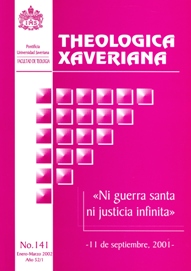Abstract
Muchos de los acontecimientos trágicos de última hora, empezando por la destrucción de las torres gemelas de Nueva York, tienen, o pretenden tener, una significación religiosa y gran parte de la violencia que se enseñorea del mundo obedece a presuntos llamados a defender los intereses de la fe. Lo anterior responde a posiciones fundamentalistas que postulan muchos como imperativos de conciencia, la destrucción o el castigo del otro, que es el infiel. Después del 11 de septiembre del 2001, el problema ha saltado a primerísimos lugares en la opinión pública que se pregunta el por qué de semejante situación tan absurda. Al volver a los orígenes de las religiones cristiana e islámica, se ve que existe en ellas un llamado, no a la guerra, sino a la paz. Entonces ¿por qué y cómo surgió, dentro del islam y del cristianismo, el concepto y la realidad de la llamada guerra santa? Con todo lo que de sugerente a la imaginación tiene el fenómeno de la cruzada para rescatar los santos lugares de la dominación musulmana, se concluye que ni las guerras de cristianos, ni las guerras religiosas del islam pueden llamarse guerras santas.Esta revista científica se encuentra registrada bajo la licencia Creative Commons Reconocimiento 4.0 Internacional. Por lo tanto, esta obra se puede reproducir, distribuir y comunicar públicamente en formato digital, siempre que se reconozca el nombre de los autores y a la Pontificia Universidad Javeriana. Se permite citar, adaptar, transformar, autoarchivar, republicar y crear a partir del material, para cualquier finalidad (incluso comercial), siempre que se reconozca adecuadamente la autoría, se proporcione un enlace a la obra original y se indique si se han realizado cambios. La Pontificia Universidad Javeriana no retiene los derechos sobre las obras publicadas y los contenidos son responsabilidad exclusiva de los autores, quienes conservan sus derechos morales, intelectuales, de privacidad y publicidad.
El aval sobre la intervención de la obra (revisión, corrección de estilo, traducción, diagramación) y su posterior divulgación se otorga mediante una licencia de uso y no a través de una cesión de derechos, lo que representa que la revista y la Pontificia Universidad Javeriana se eximen de cualquier responsabilidad que se pueda derivar de una mala práctica ética por parte de los autores. En consecuencia de la protección brindada por la licencia de uso, la revista no se encuentra en la obligación de publicar retractaciones o modificar la información ya publicada, a no ser que la errata surja del proceso de gestión editorial. La publicación de contenidos en esta revista no representa regalías para los contribuyentes.


